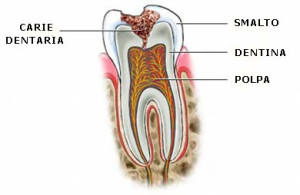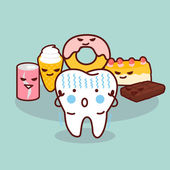If you think that coal is the worst gift you can find in the stocking of the Epiphany, you are wrong, because the Epiphany could bring you something equally black, but much more dangerous: caries!
The Epiphany is the last day of a period of holidays that puts us to the test from the point of view of nutrition and consequently also tests the health of our teeth. Sweets, candies and even coal are delicious treats for the bacteria that live in our mouth.
Bacteria and tooth decay in our mouth: a delicate balance
 Between our body and the bacteria that live in our mouth there is a delicate balance, a relationship that in nature is defined as mutual opportunism. Bacteria feed on the residues of what we eat, at the same time defending us from external bacteria that could be carriers of diseases.
Between our body and the bacteria that live in our mouth there is a delicate balance, a relationship that in nature is defined as mutual opportunism. Bacteria feed on the residues of what we eat, at the same time defending us from external bacteria that could be carriers of diseases.
We are talking about a delicate balance because the number of bacteria should remain constant, saliva has the function of diluting acids and dragging excess bacteria into the stomach, where they are destroyed.
When this mechanism does not work effectively, due to reduced salivation or in the event that bacteria multiply quickly, our body pays for the consequences.
As acidity increases in our mouth, acid-resistant microorganisms proliferate, of which they are also the main producers.
Under these conditions there is a progressive lowering of the pH, below the critical value of pH 5.5 the caries process starts and consequent corrosion of the enamel.
24 hours without oral hygiene: hell of caries
Among the friendly inhabitants of our mouth there is streptococcus mutans, one of the main bacteria that cause tooth decay.
 Feeding on the carbohydrates that we ingest, it produces an adhesive substance, insoluble in water that adheres to the enamel of the teeth and attracts other microorganisms that feed on sugars producing slag with a very high acid content.
Feeding on the carbohydrates that we ingest, it produces an adhesive substance, insoluble in water that adheres to the enamel of the teeth and attracts other microorganisms that feed on sugars producing slag with a very high acid content.
Two to three hours after the meal, the colonies of bacteria already populate the entire surface of the tooth in a leopard spot.
After twelve hours the tooth is completely covered with bacteria with stratifications of 8-10 cells, after 24 hours, without an oral hygiene intervention, the cell layers become 100.
The enzymes produced by bacteria are able to attack the hard tissues of the tooth; in its initial stage, caries does not generate particular symptomatic conditions, but when it pushes deeply and attacks the dentine, the layer that encloses the pulp, discomfort and pain begin to appear.
If no action is taken in time, the infection can reach the nerves and blood vessels of the dental pulp, spreading into numerous painful pathologies: neuralgia, pulpits, abscesses which in turn give rise to even more serious diseases, such as periodontitis.
In order not to do wrong to the Befana, we can also consume all the contents of her stocking, but we keep in mind the speed with which the bacteria proliferate in our mouth.
That delicate balance between the number of bacteria and saliva is a guarantee of our well-being, brushing your teeth within an hour of the end of each meal is the good rule of thumb to derive mutual benefit from bacteria.
















